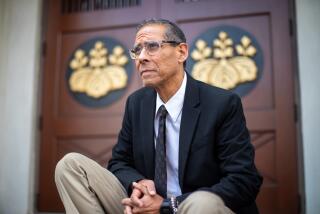Ex-Husband: Marion Jones Used Steroids
- Share via
The ex-husband of three-time Olympic champion Marion Jones told federal investigators that she used several banned performance-enhancing drugs during the 2000 Olympics in Sydney, two newspapers reported.
Jones won an unprecedented five track medals at those games, three of them gold.
Her attorney Joseph Burton accused C.J. Hunter of lying out of bitterness over the breakup of the couple’s marriage.
Hunter told Internal Revenue Service investigators that he injected his then-wife with banned substances and saw Jones inject herself with the drugs at their home in Australia, the San Francisco Chronicle said.
The San Jose Mercury News also reported Hunter’s comments, citing anonymous sources.
Human growth hormone, the steroid THG, insulin and the endurance-boosting drug EPO were among the substances Hunter alleged Jones used.
Angela DeMent, Hunter’s lead attorney, told the Mercury News, “It is totally inappropriate for me or any attorney to publicly comment about the facts of a pending case or pending investigation. That being said, perjury is a serious crime and those who commit that crime should be punished accordingly.”
Hunter, the 1999 world shot put champion, tested positive for steroids four times in 2000 -- when he was married to Jones.
At a packed news conference in Sydney where Hunter broke down in tears and tried to explain away his positive tests, Victor Conte sat by his side and commented as his “nutritionist.”
Conte founded the Bay Area Laboratory Co-Operative and is one of four people charged with distributing steroids through the laboratory. Jones and boyfriend Tim Montgomery -- world record holder at 100 meters -- were among those who testified before the grand jury that indicted the four.
Jones has asked that her grand jury testimony be made public, and has provided a lie detector test results as evidence she told the truth when she adamantly denied using banned substances.
Montgomery, however, is among four track athletes accused by the U.S. Anti-Doping Agency of drug violations, even though they have not tested positive. The accusations are based on evidence gathered by the USADA as a result of the BALCO probe. USADA is seeking to ban all four from the sport for life.
Last month, the Chronicle published what it said was Montgomery’s grand jury testimony in which he admitted using steroids.
Jones remains under investigation by BALCO, although she has not been formally accused of any offense.
Travis Tygart, director of legal affairs for the U.S. Anti-Doping Agency, would not comment specifically on Jones’ case.
But, he said, “USADA is extremely appreciative of those individuals who come forward with relevant information and USADA is following up on every lead it receives.”
Jones has qualified only for the long jump at next month’s Athens Olympics.
Citing investigators’ memos, the Chronicle reported that Hunter gave a 2 1/2-hour interview to IRS investigators on June 8 in Raleigh, N.C., and had a follow-up call a week later.
During the interview, Hunter alleged that Jones had used banned substances before, during and after the Sydney Olympics.
“Hunter stated that he saw Jones inject herself with EPO,” IRS agent Erwin Rogers wrote in one of the memos quoted by the Chronicle. “Jones would inject herself in the front waist line area slightly underneath the skin. ... Initially, Hunter injected Jones because Jones did not want to inject herself in this location.”
Hunter said that Jones obtained performance-enhancing drugs from Conte and her then-coach Trevor Graham. Graham has denied every supplying an athlete with banned substances. Three of the sprinters Graham coaches -- Shawn Crawford, Justin Gatlin and LaTasha Colander -- qualified for the U.S. team in Athens and are considered medal contenders.
Burton lashed back in a letter Friday to the U.S. attorney in San Francisco, saying he and his client “expect” federal authorities to administer a lie-detector test to Hunter, then charge him with lying to authorities if he fails, “as he most certainly will.”
In his letter to U.S. attorney Kevin Ryan, obtained by The Associated Press, Burton asked for an investigation into the leaks, and he called the government “a prime suspect” as their source.
“In addition to harming the defendants in the pending criminal case, these leaks appear to have as a primary purpose to destroy the reputations of non-defendant athletes and subject them to inquiry by the United States Anti-Doping Agency,” Burton wrote.
“With the Olympic Games approaching,” his letter said, “these defamatory statements can only cause further damage to Ms. Jones’ reputation, and further hinder her ability to prepare for and compete in Athens.”
More to Read
Go beyond the scoreboard
Get the latest on L.A.'s teams in the daily Sports Report newsletter.
You may occasionally receive promotional content from the Los Angeles Times.










